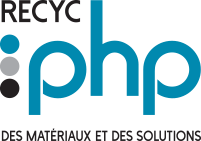— Friday, November 18 2016
Last Friday, Martin Clermont, president and CEO of Solutions Will, came to Recyc PHP’s office to hand over a check for $3913.29 to Daniel Fortin, president and founder of the company.
The Marketing of Carbon Credits
This check is given to Recyc PHP as a result of its efforts to reduce greenhouse gas (GHG) emissions. These were qualified as a member of the Sustainable Community solution. This allowed Solutions Will to quantify them, group them with other members, convert them into VCU (carbon stocks) and cash them on the voluntary carbon market. The climatic commitment of Recyc PHP has therefore earned a carbon income to the extent of its efforts.
Recyc PHP was not at its first carbon revenue encashment due to its GHG reductions. Indeed, in 2014, the company was able to note that its efforts with other members of the Sustainable Community solution brought back a first amount. It is therefore a stimulating economic incentive to continue in this direction.
How Do Carbon Credits Work?
The Will’s Sustainable Communities solution rewards GHG reductions. Indeed, this “carbon community stimulates the reduction of GHG emissions by encouraging local managers to share information, solutions and opportunities for sustainable development” and specifically to climate actions. By combining the efforts of several emitters not subject to the regulated carbon market (companies, municipalities and other organizations), which share a single territory, it is possible to “create a significant volume of GHGs subsequently converted into carbon credits and traded on the voluntary market.” Several actions can be taken to reduce GHG emissions. For example, it may be by reducing energy consumption, recovering and reusing waste, optimizing transport management and much more. (Solutions Will, 2016)
A Solution Close to the Heart of Recyc PHP
Recyc PHP has a constant desire to improve its ecological footprint. Whether it is by optimizing its transport activities, reducing waste from its production activities, using electric heating (low carbon) in its building or by installing a recovery system throughout the building, environment and sustainable development (SD) are at the heart of the company’s decisions. By the way, the main activity of Recyc PHP is to give a second life to industrial post-production materials by recycling materials that would have been destined for landfills.
The participation of Recyc PHP, which is also a customer of the CAE of Drummondville, to the Sustainable Community of Will is therefore a way of generating a carbon income while reducing its GHG emissions. Putting a sustainable development project on foot was quite natural for the company. It already had environmental initiatives and concerns, before the partnership with Will.




 1 819 477-1309
1 819 477-1309 Contact us
Contact us
